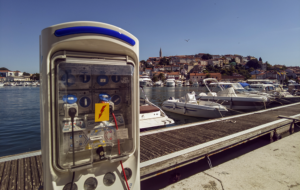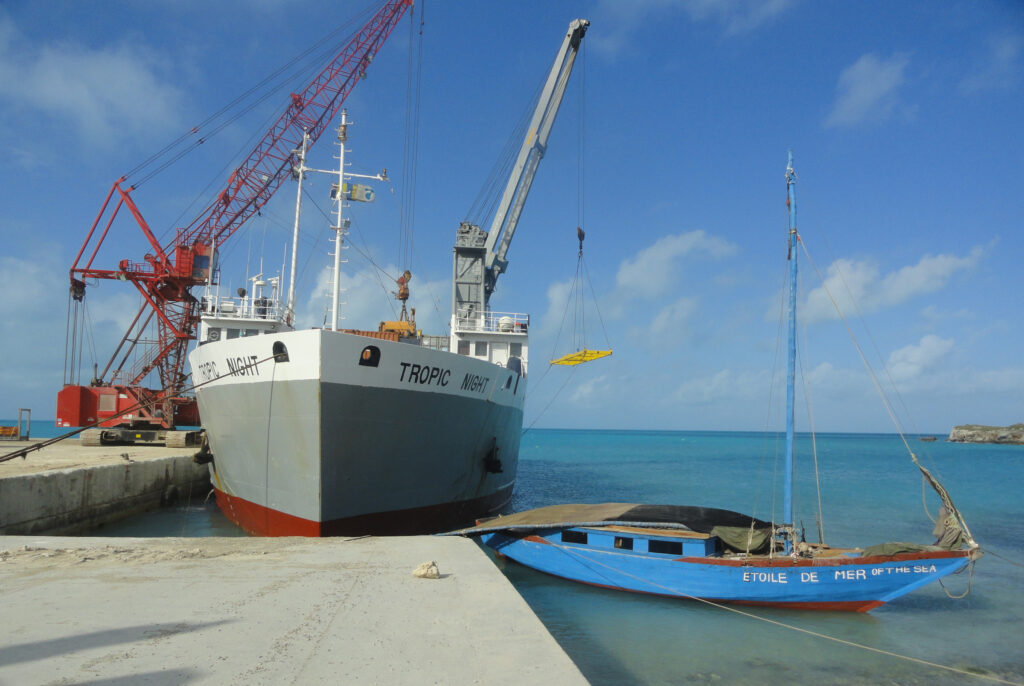Climate change vulnerabilities demand increased capital investment.
By Jan Sierhuis*
The buzz words at maritime events these days are ‘decarbonisation’ and ‘digitalisation’. As ships get greener and more efficient, there is a growing need for port partners that assist in ‘making the change’.
 Ship owners look for ports that can invest in clean fuel bunker facilities, shore power and a single maritime window system that integrates port and cargo operations so less time is spent in port. With digitalisation comes the issue of cyber and physical security to protect even more complex port facilities and digital systems.
Ship owners look for ports that can invest in clean fuel bunker facilities, shore power and a single maritime window system that integrates port and cargo operations so less time is spent in port. With digitalisation comes the issue of cyber and physical security to protect even more complex port facilities and digital systems.
Investors take a long-term view of developments in relevant shipping and port financing markets. But predicting Caribbean trends becomes increasingly difficult in the present complex shipping environment.

Slowing growth
The recently published Review of Maritime Transport 2023 by the United Nations Conference on Trade and Development (UNCTAD) states that the future of shipping is complex and the outlook is mixed. Growth in maritime trade is slowing and so are orders for construction of new ships. Thus, the introduction of new green ships will not go fast enough in the light of the International Maritime Organization’s 2050 decarbonisation targets.
UNCTAD’s Head of Trade Logistics, Jan Hoffman, recently warned that, although emissions per ton-mile are improving, total emissions keep growing due to an aging fleet and longer sailing distances (… because of trade tensions and conflicts). Congestion is declining after the pandemic but waiting times remain high particularly in developing countries. All this translates into higher shipping costs for the next decade as compared to the pre-Covid period.
Port performance must be standardised to improve transparency and efficiency. And digitalisation of trade facilitation through a Maritime Single Window can increase public-private collaboration and reduce wait time in port.
Targeted action is required to create wider support for the IMO’s decarbonisation agenda and to combat the inflationary effects of high freight rates, particularly for the most vulnerable Small Island Developing States (SIDS). Within UNCTAD and IMO there are efforts to mitigate the effects for the SIDS.
Smaller ports
In the Caribbean (e.g., Panama, Jamaica and the Dominican Republic), International port operators are planning projects in communication with their customers. And most have direct access to private equity or partnership funding. But what about the smaller regional ports? How are they planning and investing to make this transition?
 Some are teaming up with investments from Asia or the Middle East. Others seek external funding brokered through regional funding agencies such as the Caribbean Development Bank (CDB).
Some are teaming up with investments from Asia or the Middle East. Others seek external funding brokered through regional funding agencies such as the Caribbean Development Bank (CDB).
CDB’s work in the port sector will see continued and strengthened collaboration with partners, including the Inter-American Committee on Ports (CIP) of the Organization of American States (OAS), as we leverage specialist technical expertise and climate financing to help Caribbean ports perform in the changing global landscape. CDB’s total port-related investment portfolio amounts to approximately USD294 million, coming from various private and public funding sources.
“While continuing to support current port modernisation projects in St. Vincent and the Grenadines and in Montserrat, addressing the role of the port sector in intra-regional trade has been a priority for the CDB during 2023. In addition to conducting a Study for the Establishment of a Maritime Service to Improve Agriculture Trade and Food Security in the southern Caribbean, together with the International Trade Centre, CDB undertook a Logistics Chain Studies for Grenada and Saint Lucia. During 2024, building resilience through improved connectivity and port infrastructure in Borrowing Member Countries (BMC’s) will remain a priority,” said William Ashby, Portfolio Manager for CDB’s Economic Infrastructure Division.
Decarbonisation and digitalisation are uppermost on the investment agenda of the Caribbean ports. The need for extra-regional funding is recognised but attention is also now on Caribbean sources. The UNCTAD Global Supply Chain Forum in Barbados in May 2024 is expected to push the regional fuel transition agenda forward. Participation by Caribbean ports in this forum is pivotal.
The Dutch Caribbean is also preparing as we have seen each port in its own unique way, as market circumstances dictate and socio-economic realities allow.
The Caribbean maritime transport system may be vulnerable to Climate Change but it has also proven its resilience. The question remains whether Caribbean ports can withstand 2023’s inflationary pressures and, in the year ahead, protect their citizens from ever-rising transportation costs. []
- First published: December 1, 2023

*Jan Sierhuis is a Caribbean maritime specialist and Portside Caribbean columnist.
#CaribbbeanPorts #SmallPorts #ClimateChange





